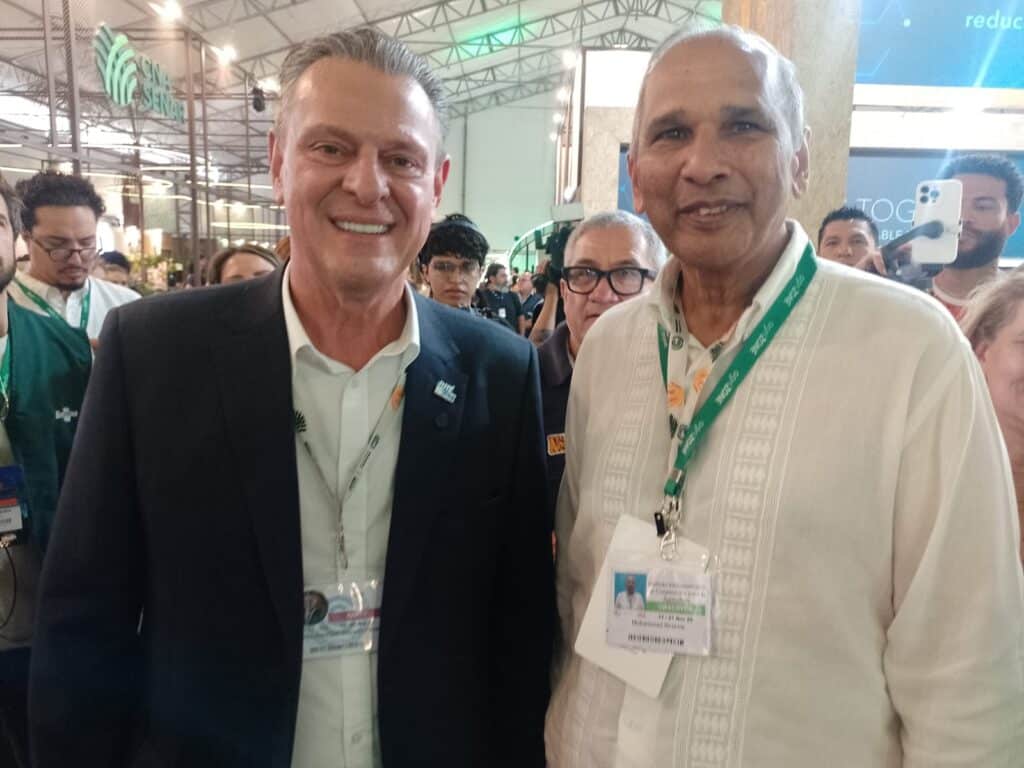
Belém do Pará, Brazil, 21 November 2025 (IICA). The Director General-elect of the Inter-American Institute for Cooperation on Agriculture (IICA), Muhammad Ibrahim, took part in COP30 in Belém do Pará, Brazil, where he held high-level meetings, received and presented proposals for his future management of the organization, and pledged to support, with a focus on science and innovation, efforts to strengthen and diversify Bolivia’s agricultural production.
At the COP, Ibrahim met with Bolivia’s new Vice President, Edmand Lara, and the Minister for Rural Productive Development and Water, Óscar Justiniano, who expressed interest in deepening the relationship with the hemispheric organization, which they regard as a strategic partner for promoting capabilities adapted to different agroecological conditions.
Bolivia’s agriculture is carried out in lowland and submontane areas, and also in the Altiplano (highlands), where farmers have to contend with severe water scarcity.
Lara explained Bolivia’s decision to draw up a strategic State plan for the development of its agriculture, aimed at strengthening food security, and expressed his country’s interest in receiving technical cooperation from IICA.
The meeting took place in the COP Blue Zone in Belém, the city in Brazil’s Amazon region that has been the focus of the world’s attention for the past two weeks as countries negotiate new commitments for tackling the economic, social and climate challenges facing the planet.
Lara took office as the Vice President of Bolivia on 8 November, as a member of the new government headed by President Rodrigo Paz.
Ibrahim was elected to serve as the next Director General of IICA by an absolute majority of the ministers of agriculture of the Americas on 4 November in Brasilia, during a conference organized by the Brazilian government and IICA.
The Guyanese agronomist, whose has nearly four decades of experience in international cooperation, will succeed Argentine veterinarian Manuel Otero in the position. The swearing-in ceremony will take place on 15 January at IICA Headquarters in San José, Costa Rica.

Silvia Massruhá, President of the Brazilian Agricultural Research Corporation (EMBRAPA); Carlos Fávaro, Minister of Agriculture and Livestock of Brazil; Helder Barbalho, Governor of the State of Pará; and Muhammad Ibrahim, Director General-elect of IICA
Agriculture and development in the Americas
During his participation in COP30, the Director General-elect of the Inter-American Institute for Cooperation on Agriculture (IICA) pledged to deepen the hemispheric organization’s efforts to optimize the role of the agriculture sector as an engine of economic development in the countries of the Americas, and to improve the quality of life in rural areas.
Ibrahim played an active role in the world’s largest environmental forum, which this year is taking place in Belém do Pará, in Brazil’s Amazon region, where he announced that next year his organization would be focusing on promoting agricultural transformation based on science and new technologies, but also emphasized the importance of the local and ancestral knowledge of communities in rural territories.

Carlos Fávaro, Minister of Agriculture and Livestock of Brazil; Helder Barbalho, Governor of the State of Pará; and Muhammad Ibrahim, Director General-elect of IICA
In Belém do Pará, Ibrahim met with, among others, Brazil’s Minister of Agriculture and Livestock, Carlos Fávaro; the President of the Brazilian Agricultural Research Corporation (EMBRAPA), Silvia Massruhá; the Deputy Executive Secretary of the United Nations Convention to Combat Desertification and former Minister of Environment of Costa Rica, Ana Meza Murillo; the Director of the World Rural Forum, Belén Citoler;and the Manager of Climate Action and Positive Biodiversity at CAF-Development Bank of Latin America and the Caribbean, Alicia Montalvo. The Governor of the northern Brazilian state of Pará, Helder Barbalho, also visited the IICA Pavillion.
Ibrahim was invited to speak at the presentation of the CAF’s Agricultural Prosperity Strategy for Latin America and the Caribbean, which focuses on financing for resilience and as a tool to promote inclusive sustainable development in the region.

Tomás Patriota, Advisor to Brazil’s Ministry of Agrarian Development and Family Farming; Muhammad Ibrahim, Director General-elect of IICA; and Alicia Montalvo, Manager of Climate Action and Positive Biodiversity at CAF-Development Bank of Latin America and the Caribbean
At the event, CAF reaffirmed its commitment to investing USD 40 billion over the next five years in the green agenda, with agricultural projects figuring prominently in the plan.
During the meeting, Ibrahim said it was essential to deepen IICA’s strategic partnerships with multilateral financing organizations, to ensure that projects have the greatest possible impact in the territories.
He also took part in the launch of an IICA project that will be implemented in Bolivia, Brazil, Chile, Paraguay, and Uruguay, aimed at reducing the climate vulnerability of the productive sector and strengthening family farming. This initiative was submitted to the Adaptation Fund, an international mechanism established to help developing countries finance projects and programs that address the adverse effects of climate change.

IICA Director General-elect Muhammad Ibrahim also met with Edmand Lara, Vice President of Bolivia, and his colleague Óscar Justiniano, Minister of Rural Productive Development and Water.
More information:
Institutional Communication Division.
comunicacion.institucional@iica.int











